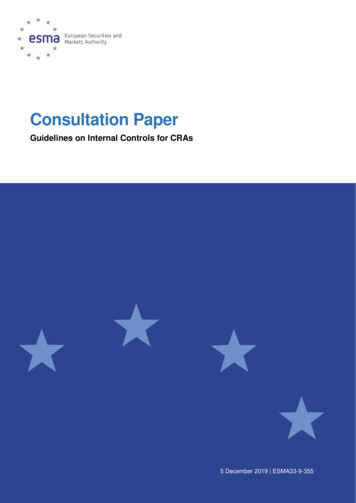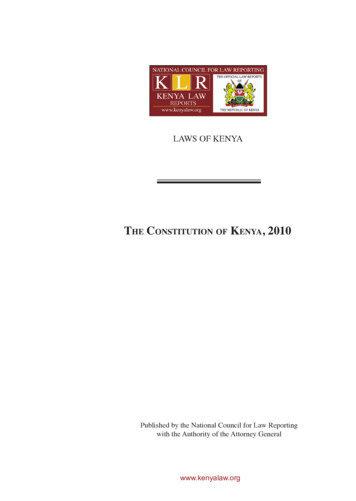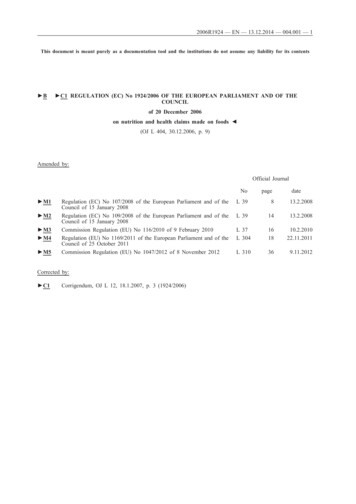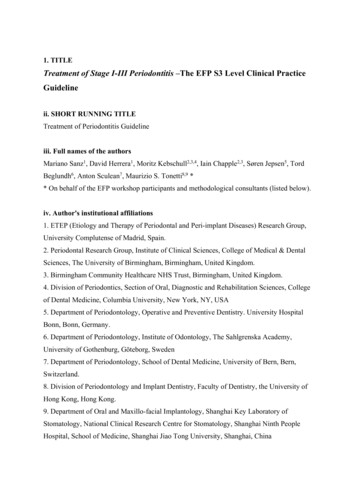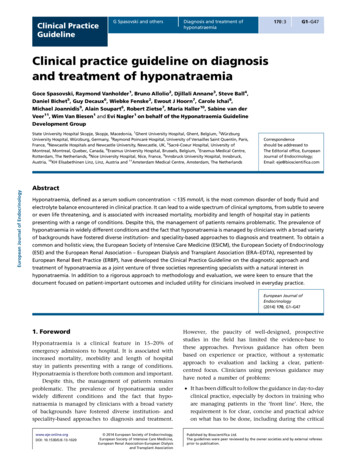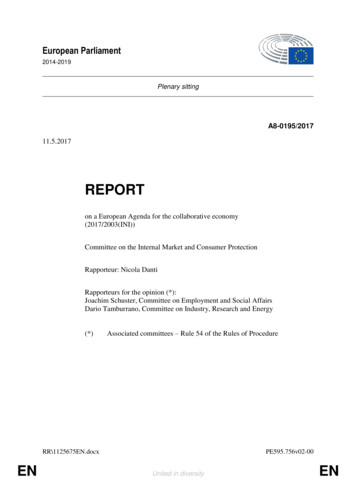
Transcription
European Parliament2014-2019Plenary sittingA8-0195/201711.5.2017REPORTon a European Agenda for the collaborative economy(2017/2003(INI))Committee on the Internal Market and Consumer ProtectionRapporteur: Nicola DantiRapporteurs for the opinion (*):Joachim Schuster, Committee on Employment and Social AffairsDario Tamburrano, Committee on Industry, Research and Energy(*)Associated committees – Rule 54 of the Rules of ProcedureRR\1125675EN.docxENPE595.756v02-00United in diversityEN
PR INICONTENTSPageMOTION FOR A EUROPEAN PARLIAMENT RESOLUTION . 3EXPLANATORY STATEMENT. 15ANNEX: LIST OF ENTITIES OR PERSONS FROM WHOM THE RAPPORTEUR HASRECEIVED INPUT . 20OPINION OF THE COMMITTEE ON EMPLOYMENT AND SOCIAL AFFAIRS . 22OPINION OF THE COMMITTEE ON INDUSTRY, RESEARCH AND ENERGY . 32OPINION OF THE COMMITTEE ON TRANSPORT AND TOURISM . 38INFORMATION ON ADOPTION IN COMMITTEE RESPONSIBLE . 46FINAL VOTE BY ROLL CALL IN COMMITTEE RESPONSIBLE . 47PE595.756v02-00EN2/47RR\1125675EN.docx
MOTION FOR A EUROPEAN PARLIAMENT RESOLUTIONon a European Agenda for the collaborative economy(2017/2003(INI))The European Parliament,–having regard to its resolution of 19 January 2016 on Towards a Digital Single MarketAct1,–having regard to its resolution of 26 May 2016 on the Single Market Strategy2,–having regard to its resolution of 24 November 2016 on new opportunities for smalltransport businesses, including collaborative business models3,–having regard to the meeting of the Council High Level Working Group onCompetitiveness and Growth of 12 September 2016 and the Presidency's discussionpaper on the subject4,–having regard to the Commission communication on a European agenda for thecollaborative economy of 2 June 2016 (COM(2016)0356),–having regard to the Commission communication of 25 May 2016 on online platformsand the Digital Single Market opportunities and challenges for Europe(COM(2016)0288),–having regard to the Commission communication entitled ‘Upgrading the SingleMarket: more opportunities for people and business’ of 28 October 2015(COM(2015)0550),–having regard to the Commission communication of 6 May 2015 on a Digital SingleMarket Strategy for Europe 2015 (COM(2015)0192),–having regard to the Competitiveness Council of 29 September 2016 and its outcome,–having regard to Directive 2006/123/EC of the European Parliament and of the Councilof 12 December 2006 on services in the internal market (‘Services Directive’)5,–having regard to Directive 2000/31/EC of the European Parliament and of the Councilof 8 June 2000 on certain legal aspects of information society services, in particularelectronic commerce, in the internal market (‘Electronic Commerce Directive’)6,–having regard to Directive 2005/29/EC of the European Parliament and of the Councilof 11 May 2005 concerning unfair business-to-consumer commercial practices in theinternal market and amending Council Directive 84/450/EEC, Directives 97/7/EC,1Texts adopted, P8 TA(2016)0009.Texts adopted, P8 TA(2016)0237.3Texts adopted, P8 ocument/ST-11834-2016-INIT/en/pdf5OJ L 376, 27.12.2006, p. 36.6OJ L 178, 17.7.2000, p. 1.2RR\1125675EN.docx3/47PE595.756v02-00EN
98/27/EC and 2002/65/EC of the European Parliament and of the Council, andRegulation (EC) No 2006/2004 of the European Parliament and of the Council (‘UnfairCommercial Practices Directive’)1,–having regard to Directive 2009/136/EC of the European Parliament and of the Councilof 25 November 2009 amending Directive 2002/22/EC on universal service and users’rights relating to electronic communications networks and services, Directive2002/58/EC concerning the processing of personal data and the protection of privacy inthe electronic communications sector and Regulation (EC) No 2006/2004 oncooperation between national authorities responsible for the enforcement of consumerprotection laws (‘Consumer Rights Directive’)2,–having regard to the Commission staff working document of 25 May 2016 on guidanceon implementation of the Unfair Commercial Practices Directive (UCPD)(SWD(2016)0163),–having regard to Regulation (EU) 2016/679 of the European Parliament and of theCouncil of 27 April 2016 on the protection of natural persons with regard to theprocessing of personal data and on the free movement of such data, and repealingDirective 95/46/EC (‘General Data Protection Regulation’)3,–having regard to the opinion of the Committee of the Regions of 7 December 2016entitled ‘The collaborative economy and online platforms: a shared view of cities andregions’4,–having regard to the opinion of the European Economic and Social Committee of 15December 2016 on the collaborative economy5,–having regard to Rule 52 of its Rules of Procedure,–having regard to the report of the Committee on the Internal Market and ConsumerProtection and the opinions of the Committee on Employment and Social Affairs, theCommittee on Industry, Research and Energy and the Committee on Transport andTourism (A8-0195/2017),A.whereas the collaborative economy has experienced rapid growth in recent years, interms of users, transactions and revenues, reshaping how products and services areprovided and challenging well-established business models in many areas;B.whereas the collaborative economy has social benefits for EU citizens,C.whereas small and medium-sized enterprises (SMEs) are the main engine of theEuropean economy, representing, according to 2014 figures, 99.8 % of all undertakingsoutside the financial sector and accounting for two out of three of all jobs;1OJ L 149, 11.6.2005, p. 22.OJ L 337, 18.12.2009, p. 11.3OJ L 119, 4.5.2016, p. 1.4ECON-VI/016.5INT/793 RR\1125675EN.docx
D.whereas only 1.7 % of enterprises in the EU make full use of advanced digitaltechnologies, while 41 % do not use them at all; whereas the digitalisation of all sectorsis crucial if the EU’s competitiveness is to be maintained and improved;E.whereas a recent study by the Commission shows that 17 % of European consumershave used services provided by the collaborative economy, and 52 % are aware of theservices offered1;F.whereas there are no official statistics on the volume of employment in the collaborativeeconomy;G.whereas the collaborative economy offers possibilities for young people, migrants, parttime workers and senior citizens to access the labour market;H.whereas collaborative economy models can help to boost the participation of women inthe labour market and the economy, by providing opportunities for flexible forms ofentrepreneurship and employment;I.whereas, while the recent Commission communication on a European agenda for thecollaborative economy presents a good starting point for promoting and regulating thissector effectively, there is a need to incorporate the gender equality perspective and toreflect the provisions of the relevant anti-discrimination legislation in the context offurther analysis and recommendations in this field;J.whereas promoting social justice and protection, as defined in Article 3 of the Treaty onEuropean Union and Article 9 on the Treaty on the Functioning of the European Union,is also an objective of the EU’s internal market;General considerations1.Welcomes the communication on a European agenda for the collaborative economy,and underlines that it should represent a first step towards a well-balanced, morecomprehensive and ambitious EU strategy on the collaborative economy;2.Believes that, if developed in a responsible manner, the collaborative economy createssignificant opportunities for citizens and consumers, who benefit from enhancedcompetition, tailored services, increased choice and lower prices; underlines that thegrowth in this sector is consumer driven and allows consumers to take a more activerole;3.Stresses the need to enable businesses to grow by removing hurdles, duplication andfragmentation that hinders cross-border development;4.Encourages Member States to provide legal clarity and not to view the collaborativeeconomy as a threat to the traditional economy; stresses the importance of regulating thecollaborative economy in a way that is facilitating and enabling rather than restrictive;5.Agrees that the collaborative economy generates new and interesting entrepreneurialopportunities, jobs and growth, and frequently plays an important role in making the1Flash Eurobarometer 438 (March 2016) on ‘The use of collaborative N
economic system not only more efficient, but also socially and environmentallysustainable, allowing for a better allocation of resources and assets that are otherwiseunder-used, and thus contributing to the transition towards a circular economy;6.Acknowledges, at the same time, that the collaborative economy can have a significantimpact on long-established regulated business models in many strategic sectors such astransportation, accommodation, the restaurant industry, services, retail and finance;understands the challenges linked to having different legal standards for similareconomic actors; believes that the collaborative economy empowers consumers, offersnew job opportunities and has the potential to facilitate tax compliance, but stressesnevertheless the importance of ensuring a high level of consumer protection, of fullyupholding workers’ rights and of ensuring tax compliance; recognises that thecollaborative economy affects both urban and rural environments;7.Points to the lack of clarity among entrepreneurs, consumers and authorities as to howto apply current regulations in some areas and thus the need to address regulatory greyareas, and is concerned about the risk of fragmentation of the single market; is awarethat, if not properly governed, these changes could result in legal uncertainty aboutapplicable rules and constraints in exercising individual rights and protectingconsumers; believes that regulation needs to be fit for purpose for the digital age and isdeeply concerned about the negative impact of legal uncertainty and the complexity ofrules on European start-ups and non-profit organisations involved in the collaborativeeconomy;8.Considers that the development of a dynamic, clear and, where appropriate, harmonisedlegal environment and the establishment of a level playing field is an essentialprecondition for a flourishing collaborative economy in the EU;Collaborative economy in the EU9.Emphasises the need to consider the collaborative economy not only as a collection ofnew business models offering goods and services but also as a new form of integrationbetween the economy and society where the services offered are based on a wide varietyof relations embedding economic relations within social ones and creating new forms ofcommunity and new business models;10.Notes the fact that the collaborative economy in Europe has some specific traits, alsoreflecting the European business structure, which consists mainly of SMEs and microenterprises; stresses the need to ensure a business environment where collaborativeplatforms are able to scale-up and be highly competitive on the global market;11.Notes that European entrepreneurs show a strong propensity for creating collaborativeplatforms for social purposes, and acknowledges a growing interest in the collaborativeeconomy based on cooperative business models;12.Underlines the importance of preventing any form of discrimination, so as to granteffective and equal access to collaborative services;13.Considers that those services offered within the collaborative economy which arepublicly advertised and offered for profit fall within the remit of Council DirectivePE595.756v02-00EN6/47RR\1125675EN.docx
2004/113/EC implementing the principle of equal treatment between men and women inthe access to and supply of goods and services and should, therefore, be consistent withthe principle of equal treatment of women and men;EU regulatory framework: peers, consumers, collaborative platforms14.Recognises that while certain parts of the collaborative economy are covered by regulation,including at local and national level, other parts may fall into regulatory grey areas as it isnot always clear which EU regulations apply, thus causing significant differences amongthe Member States due to national, regional and local regulations as well as case-law,thereby fragmenting the Single Market;15.Welcomes the Commission's intention to tackle the current fragmentation, but regretsthat its communication did not bring sufficient clarity about the applicability of existingEU legislation to different collaborative economy models; emphasises the need for theMember States to step up enforcement of existing legislation, and calls on theCommission to aim for an enforcement framework supporting the Member States intheir efforts, most importantly regarding the Services Directive and the consumeracquis; calls on the Commission to make full use of all tools available in this context,including infringement procedures, whenever incorrect or insufficient implementationof the legislation is identified;16.Stresses that market access requirements for collaborative platforms and serviceproviders must be necessary, justified and proportionate as provided for in the Treatiesand secondary legislation, as well as simple and clear; underlines that this assessmentshould take into consideration whether services are provided by professionals or privateindividuals, making peer providers subject to lighter legal requirements, while ensuringquality standards and a high level of consumer protection as well as taking into accountsectoral differences;17.Recognises the need for incumbents, new operators and services linked to digitalplatforms and the collaborative economy to develop in a business friendly environment,with healthy competition and transparency with regard to legislative changes; agreesthat when assessing market access requirements in the context of the Services Directive,Member States should take into account the specific features of collaborative economybusinesses;18.Urges the Commission to work together with Member States to provide furtherguidelines on laying down effective criteria for distinguishing between peers andprofessionals, which is crucial for the fair development of the collaborative economy;points out that these guidelines should provide clarity and legal certainty and take intoaccount, inter alia, the differing legislation in Member States and their economicrealities, such as income level, the characteristics of the sectors, the situation of microand small businesses and the profit making purpose of the activity; is of the opinion thata set of general principles and criteria at EU level and a set of thresholds at nationallevel could be a way forward, and calls on the Commission to conduct a study in thisrespect;19.Draws attention to the fact that while establishing thresholds can provide appropriatedividing lines between peers and businesses, it may, at the same time, create a disparityRR\1125675EN.docx7/47PE595.756v02-00EN
between micro and small businesses on the one side, and peers on the other; believesthat a level playing field among comparable categories of service providers is highlyrecommended; calls for the removal of unnecessary regulatory burdens and unjustifiedmarket access requirements for all business operators, in particular for micro and smallbusinesses, as this also stifles innovation;20.Welcomes the Commission's initiative to ensure the adequacy of consumer law andpreventing abuse of the collaborative economy to circumvent legislation; believes thatconsumers should enjoy a high and effective level of protection, regardless of whetherservices are provided by professionals or peers and highlights, in particular, theimportance of protecting consumers in peer-to-peer transactions, while recognising thatsome form of protection can be delivered by self-regulation;21.Calls for action to be taken to guarantee full use of, and constant compliance with,consumer protection rules by occasional service providers, on the same or on acomparable basis as professional service providers;22.Notes that consumers should have access to information on whether reviews by otherusers of a service might not be subject to influence from the provider, for example in theform of paid advertising;23.Points to the need for greater clarity regarding safeguards for consumers in the event ofdisputes, and calls on the collaborative platforms to ensure that effective systems are inplace for complaint procedures and settling disputes, thus facilitating the wayconsumers can exercise their rights;24.Stresses that collaborative economy business models are largely based on reputation,and highlights that transparency is essential in this respect; believes that in many casescollaborative economy business models empower consumers and allow them to take anactive role, supported by technology; emphasises that, rules for protecting consumersare still needed in the collaborative economy, especially where there are marketdominated players, asymmetric information, a lack of choice or competition; underlinesthe importance of guaranteeing adequate information for consumers about theapplicable legal regime of each transaction and consequent rights and legal obligations;25.Calls on the Commission to further clarify the liability regimes of collaborativeplatforms as quickly as possible, in order to promote responsible behaviour,transparency, legal certainty and thereby increase user confidence; acknowledges, inparticular, the lack of certainty especially on whether a platform provides an underlyingservice or is merely offering an information society service, according to the eCommerce Directive; calls, therefore, on the Commission to provide further guidanceon these aspects and to consider whether further actions are needed to make theregulatory framework more effective; encourages collaborative platforms, at the sametime, to take voluntary measures in this respect;26.Calls on the Commission to further scrutinise EU legislation in order to reduceuncertainties and guarantee greater legal certainty concerning the rules applicable tocollaborative business models and to assess whether new or amended rules areappropriate, in particular concerning active intermediaries and their information andtransparency requirements, non-performance and liability;PE595.756v02-00EN8/47RR\1125675EN.docx
27.Believes that any new regulatory framework should leverage platforms’ self-governingcapacities and peer-review mechanisms, since both have proved to work effectively andtake into account consumer satisfaction with collaborative services; is convinced thatcollaborative platforms themselves can take an active role in creating such a newregulatory environment by correcting asymmetric information, especially by means ofdigital reputation mechanisms to increase user trust; notes, at the same time, that thecollaborative platform’s self-regulating capacity does not replace the need for theexisting rules such as the Service and e-Commerce Directives, EU consumer law andother possible rules;28.Believes, therefore, that digital trust building mechanisms are an essential part of thecollaborative economy; welcomes all efforts and initiatives put in place by collaborativeplatforms to avert distortions as well as those aimed at enhancing trust and transparencyin rating and reviews mechanisms, establishing reliable reputation criteria, introducingguarantees or insurance, the identity verification of peers and prosumers, anddeveloping secure and transparent payment systems; considers these new technologicaldevelopments, such as two-way rating mechanisms, independent checks of reviews andvoluntary adoption of certification schemes as good examples of how to prevent abuses,manipulations, fraud and fake feedback; encourages collaborative platforms to learnfrom best practices and raise awareness about their users’ legal obligations;29.Points out the crucial importance of clarifying methods by which automated decisionmaking systems based on algorithms operate, in order to guarantee algorithm fairnessand transparency; asks the Commission to also examine this issue from the EUcompetition law perspective; calls on the Commission to engage with Member States,the private sector and the relevant regulators with a view to laying down effectivecriteria for developing algorithm accountability principles for information-basedcollaborative platforms;30.Emphasises the need to assess the use of data where it may have different impacts ondifferent segments of society, to prevent discrimination and to verify the potential harmto privacy caused by big data; recalls that the EU has already developed acomprehensive framework for data protection in the General Data Protection Regulation(GDPR), and therefore calls on collaborative economy platforms not to neglect the issueof data protection, by supplying transparent information to service providers and usersabout the personal data collected and the way in which those data are processed;31.Recognises that many rules from EU acquis are already applicable to the collaborativeeconomy; calls on the Commission to assess the need to further develop an EU legalframework in order to prevent further fragmentation of the Single Market in line withbetter regulation principles and Member States’ experiences; believes that thisframework should be harmonised, where appropriate, as well as flexible,technologically neutral and future proof and should consist of a combination of generalprinciples and specific rules, in addition to any sector-specific regulation that might beneeded;32.Emphasises the importance of coherent legislation in order to guarantee the properfunctioning of the internal market for all, and calls on the Commission to safeguardcurrent rules and legislation on workers’ and consumer rights before introducing newRR\1125675EN.docx9/47PE595.756v02-00EN
legislation which could fragmentise the internal market;Competition and tax compliance33.Welcomes the fact that the rise of the collaborative economy has brought greatercompetition and has challenged existing operators to focus on consumers’ real demands;encourages the Commission to foster a level playing field for competition incomparable services among collaborative platforms and between them and traditionalenterprises; stresses the importance of identifying and addressing barriers to theemergence and scaling-up of collaborative businesses, especially start-ups; underlines inthis context the need for the free flow of data, data portability and interoperability,which facilitate switching between platforms and prevent lock-in, which are all keyfactors for open and fair competition and for empowering users of collaborativeplatforms while taking into account legitimate interests of all market players andprotecting user information and personal data;34.Welcomes the increased traceability of economic transactions enabled by onlineplatforms in order to ensure tax compliance and enforcement, but is concerned about thedifficulties that have emerged so far in some sectors; stresses that the collaborativeeconomy should never be used as a way of avoiding tax obligations; stresses, further,the urgent need for collaboration between the competent authorities and collaborativeplatforms on tax compliance and collection; recognises that these issues have beenaddressed in certain Member States and takes note of successful public-privatecooperation in this field; calls on the Commission to facilitate exchange of bestpractices among Member States, involving competent authorities and stakeholders, todevelop effective and innovative solutions enhancing tax compliance and enforcement,in order to also eliminate the risk of cross-border tax fraud; invites the collaborativeplatforms to play an active role in this regard; encourages the Member States to clarifyand to cooperate on the information that different economic actors involved in thecollaborative economy must disclose to tax authorities in the framework of their taxinformation duties, as provided for by national legislation;35.Agrees that functionally similar tax obligations should be applied to businessesproviding comparable services, whether in the traditional economy or in thecollaborative economy, and believes that taxes should be paid where profits aregenerated and where more is involved than simply contributions to costs, whilerespecting the principle of subsidiarity, and also in accordance with national and localtax laws;Impact on labour market and workers’ rights36.Emphasises that the digital revolution is having a significant impact on the labourmarket and that emerging trends in the collaborative economy are part of a current trendwithin the digitalisation of society;37.Notes, at the same time, that the collaborative economy is opening new opportunitiesand new, flexible routes into work for all users, especially for the self-employed, forthose who are unemployed, currently far from the labour market or would otherwise beunable to participate in it and could thus serve as a point of entry to the labour market,especially for young people and marginalised groups; points out, however, that, in somePE595.756v02-00EN10/47RR\1125675EN.docx
circumstances, this development can also lead to precarious situations; stresses the needfor labour market flexibility, on the one hand, and for economic and social security forworkers on the other, in line with customs and traditions in Member States;38.Underlines the paramount importance of safeguarding workers' rights in thecollaborative services – first and foremost the right of workers to organise, the right ofcollective bargaining and action, in line with national law and practice; recalls that allworkers in the collaborative economy are either employed or self-employed based onthe primacy of facts and must be classified accordingly; calls on the Member States andthe Commission, in their respective areas of competence, to ensure fair workingconditions and adequate legal and social protection for all workers in the collaborativeeconomy, regardless of their status;39.Underlines the importance of ensuring the fundamental rights and adequate socialsecurity protection of the rising number of self-employed workers, who are key playersin the collaborative economy, including the right of collective bargaining and action,also with regard to their compensation;40.Encourages the Member States to recognise that the collaborative economy will alsobring disruption, and therefore to prepare absorption measures for certain sectors and tosupport training and outplacement;41.Underlines the importance of collaborative platform workers being able to benefit fromthe portability of ratings and reviews, which constitute their digital market value, andthe importance of facilitating the transferability and accumulation of ratings and reviewsacross different platforms while respecting rules on data protection and the privacy ofall parties involved; notes the possibility for unfair and arbitrary practices regardingonline ratings, which may affect the working conditions and entitlements ofcollaborative platform workers and their ability to obtain jobs; believes that rating andreview mechanisms should be developed in a transparent way and that workers shouldbe informed and consulted at the appropriate levels, and in accordance with MemberState law and practices, on the general criteria used to develop such mechanisms;42.Stresses the importance of up-to-date skills in the changing employment world and ofensuring that all workers have adequate skills as required in the digital society andeconomy; encourages the Commission, the Member States and collaborative economybusinesses to make lifelong training and digital skills development accessible; believesthat public and private investments and funding opportunities for lifelong learning andtraining are needed, especially for micro and small enterprises;43.Stresses the importance of teleworking and smartworking in connection with thecollaborative economy, and advocates, in this regard, the need to place these ways ofworking on an equal footing with traditional ones;44.Calls on the Commission to examine how far the Directive on Temporary Agency Work(2008/104/EC) is applicable to specific online platforms; considers that manyintermediating online platforms are structurally similar to temporary work agencies(triangular contractual relationship between: temporary agency worker/platform worker;temporary work agency/online platform; user 6v02-00EN
45.Calls on the national public employment services and the EURES network tocommunicate better on the opportunities offered by the collaborative economy;46.Calls on the Commission, the Member States and social partners to provide adequateinformation to platform workers on working and employment conditions and workers’rights, and on their working relationships with both platforms and users; considers thatplatforms should play a proactive role in providing information to users and workersregarding the applicable regulatory framework with a view to fulfilling legalrequirements;47.Draws attention to the lack of data relating to changes in the employment world broughtabout by the collaborative economy; calls on the Member States and the Commission,also in cooperation with social partners, to gather more reliable and comprehensive datain this respect and encourages the Member States to appoint
D. whereas only 1.7 % of enterprises in the EU make full use of advanced digital technologies, while 41 % do not use them at all; whereas the digitalisation of all sectors is crucial if the EU's competitiveness is to be maintained and improved; E. whereas a recent study by the Commission shows that 17 % of European consumers have used services provided by the collaborative economy, and 52 % .
